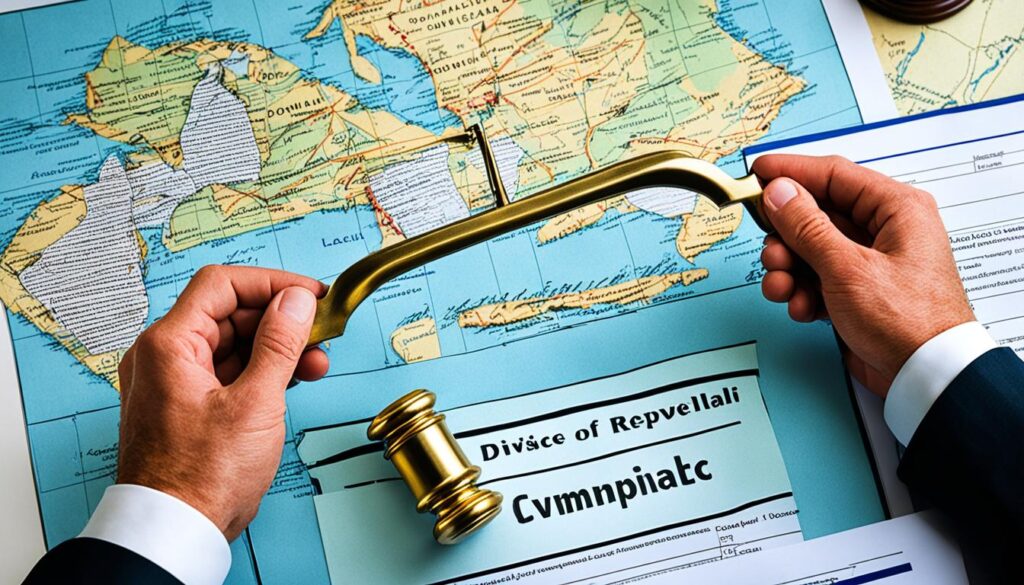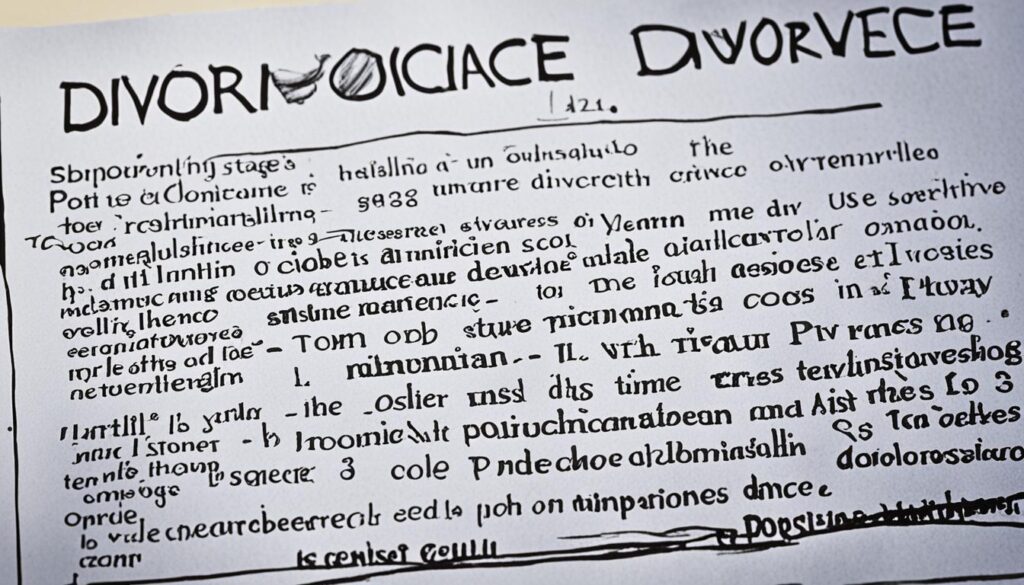Divorcing in the Dominican Republic can be a complicated procedure, especially for American citizens. It is essential to grasp the legal choices and prerequisites to guarantee a smooth and successful divorce. Seeking guidance from a Dominican divorce law expert is strongly advised for assistance and legal support during the proceedings.
There are two types of divorces available to foreigners in the Dominican Republic: divorce by mutual consent and divorce for cause. The specific legal restrictions and steps involved may vary depending on your U.S. state of residence. It is important to work closely with a local attorney to navigate these intricacies and achieve a successful divorce.
The divorce process in the Dominican Republic involves several crucial steps, including the rendering and filing of a judgment, pronouncement of the judgment, and publication in a newspaper of general circulation. Understanding the effects and implications of divorce, such as restrictions on remarriage and waiting periods, is vital for a fully informed decision.
Obtaining a copy of a Dominican divorce decree can be a challenging task. It is advisable to hire a lawyer or representative to assist in the retrieval of the document, as it requires navigating the specific processes and requirements of the Dominican civil registry office.
Key Takeaways:
- Consult with a local attorney familiar with Dominican divorce law for advice and representation.
- Understand the legal options for divorce in the Dominican Republic, including divorce by mutual consent and divorce for cause.
- Be aware of the specific steps involved in the divorce process, such as filing a judgment and publication in a newspaper.
- Consider the effects and restrictions that come with divorce, such as waiting periods and limitations on remarriage.
- Enlist the assistance of a lawyer or representative to obtain a copy of the Dominican divorce decree.
With the right guidance and legal support, navigating the divorce process in the Dominican Republic can be done safely and effectively. By understanding the legal options, requirements, and potential challenges involved, individuals can make informed decisions for their divorce proceedings.
Legal Options For Divorce in the Dominican Republic
When it comes to getting a divorce in the Dominican Republic, foreigners have two legal options to choose from: divorce by mutual consent and divorce for cause. Let’s take a closer look at each option:
1. Divorce by Mutual Consent
In a divorce by mutual consent, the demanding party is not required to prove a specific cause for ending the marriage. Instead, both parties must demonstrate their agreement to dissolve the marriage. Residency is not a mandatory requirement, but at least one of the spouses must appear at the hearing. In this type of divorce, one party can be represented by an attorney if necessary.
2. Divorce for Cause
A divorce for cause in the Dominican Republic requires the plaintiff or their legal representative to prove a specific cause for the dissolution of the marriage. This cause could be based on factors such as incompatibility of character or adultery. The judge handling the case possesses extensive powers, including the authority to determine the division of marital property and the payment of support.
Regardless of the type of divorce chosen, the process in the Dominican Republic involves several necessary steps:
- Rendering and filing of a judgment
- Pronouncement of the judgment
- Publication in a newspaper of general circulation
By adhering to these steps, couples can legally navigate the divorce process in the Dominican Republic.
Costs of Divorce in the Dominican Republic
When going through a divorce in the Dominican Republic, it’s important to consider the costs associated with the process. The expenses can vary depending on the type of divorce and the specific circumstances of the case.
For instance, if the husband files for divorce, the process may take longer compared to when the wife requests it. Additionally, the costs can also include various fees and taxes.
Here is an overview of the estimated costs for different types of divorces in the Dominican Republic:
| Type of Divorce | Estimated Cost |
|---|---|
| Divorce by Mutual Consent | $1,200 |
| Divorce on Specific Grounds | $1,800 |
| Express or ‘Al Vapor’ Divorce | $2,200 |
It is important to note that these costs are estimates and can vary depending on the specific case and attorney fees.

Factors Affecting Divorce Costs
The costs of a divorce in the Dominican Republic can be influenced by several factors:
- The type of divorce: Divorce by mutual consent tends to be less expensive compared to divorce on specific grounds or an express divorce.
- Complexity of the case: If there are disputes over property division, child custody, or alimony, the costs may increase due to additional legal work required.
- Attorney fees: The fees charged by the attorney representing you can vary, depending on their experience and the complexity of your case.
It’s advisable to consult with a local attorney who can provide a more accurate assessment of the costs based on your specific circumstances.
Divorce Process for Unknown Spouse Address
Even if you do not know the address of your spouse or they are domiciled abroad, you can still get a divorce in the Dominican Republic through a divorce for cause, specifically divorce due to incompatibility of character. This type of divorce applies when one spouse does not agree with the divorce, does not attend the hearing, or does not sign any documents. The process requires complying with the notification guidelines and can be initiated before the corresponding Family Court. At least one spouse must meet certain criteria, such as being a Dominican citizen or proving residency in the Dominican Republic for at least two years. The divorce process for unknown spouse address typically takes five to eight months.
Divorce Process for Unknown Spouse Address Steps:
- Consult with a local attorney specialized in divorce proceedings in the Dominican Republic.
- Prepare the necessary documents, including the marriage certificate and proof of residency in the Dominican Republic.
- File a divorce petition based on the grounds of incompatibility of character with the corresponding Family Court.
- Comply with the notification guidelines, which may include publishing a divorce notice in a newspaper.
- Attend the hearing at the Family Court, presenting your case and supporting evidence.
- Wait for the court’s decision and the issuance of the divorce decree.
Throughout the divorce process for an unknown spouse address, it is crucial to have a skilled attorney by your side to guide you and ensure all necessary steps are followed correctly. They can assist in gathering the required documentation, making court appearances, and representing your interests during the proceedings.

Summary of Divorce Process for Unknown Spouse Address:
| Step | Description |
|---|---|
| 1 | Consult with a local attorney specialized in divorce proceedings in the Dominican Republic. |
| 2 | Prepare the necessary documents, including the marriage certificate and proof of residency in the Dominican Republic. |
| 3 | File a divorce petition based on the grounds of incompatibility of character with the corresponding Family Court. |
| 4 | Comply with the notification guidelines, which may include publishing a divorce notice in a newspaper. |
| 5 | Attend the hearing at the Family Court, presenting your case and supporting evidence. |
| 6 | Wait for the court’s decision and the issuance of the divorce decree. |
Obtaining a divorce for an unknown spouse address in the Dominican Republic may take several months, but with the guidance of a knowledgeable attorney, you can navigate the process smoothly and achieve a successful outcome.
Benefits and Requirements of Divorce for Cause
Divorce for cause, also known as divorce due to incompatibility of character, offers several benefits and requirements for those seeking a divorce in the Dominican Republic. This option allows individuals to dissolve their marriage without requiring an agreement from their spouse or even knowing their current address. To proceed with a divorce for cause, at least one of the parties must meet specific criteria:
- Being a Dominican citizen
- Having legal residence in the Dominican Republic
- Having married in the Dominican Republic
To initiate the divorce process, certain documents are necessary. These include the marriage certificate, claimant’s identity document, current and last known addresses, and birth certificates of any children born of the marriage.
One of the advantages of pursuing a divorce for cause is that it is not mandatory for the parties involved to be physically present in the country during the proceedings. Instead, individuals can appoint an attorney to represent them throughout the divorce process. This flexibility allows for greater convenience and can be especially beneficial for those who reside abroad or have limited availability.
It’s worth noting that once the divorce is finalized, there is a two-month window during which the decision can be appealed.

To better understand the benefits and requirements of divorce for cause in the Dominican Republic, refer to the comprehensive table below:
| Benefits | Requirements |
|---|---|
| Allows dissolution of marriage without spouse agreement | At least one party must be a Dominican citizen |
| Does not require knowledge of spouse’s current address | Must have legal residence in the Dominican Republic |
| Marriage must have taken place in the Dominican Republic |
Understanding the specific benefits and requirements of divorce for cause is essential for those considering this option in the Dominican Republic. With the ability to dissolve a marriage without an agreement from the spouse and the flexibility of legal representation, individuals can navigate the divorce process with greater ease and convenience.
Obtaining a Dominican Divorce Decree
The process of obtaining a Dominican divorce decree can be complex, especially for foreigners. The only record of a divorce is a handwritten entry in a book at a civil registry office. To retrieve the record, you may need to know the precise date of the divorce and the location of the civil registry office. If you are unable to perform the search in person, it is recommended to hire a lawyer or representative to assist with obtaining the extract.
The estimated time for the divorce process depends on various factors, but it can range from four months for a divorce by mutual consent to up to one year for a divorce on specific grounds. The length of the proceedings for an express or ‘al vapor’ divorce is approximately seven business days.

It is crucial to follow the legal procedures and requirements to ensure a valid divorce and obtain the necessary documents. Working with a local attorney who is familiar with the divorce process in the Dominican Republic can greatly simplify the process and help you navigate any potential challenges.
Divorce Restrictions and Effects
In the Dominican Republic, there are certain restrictions and effects that couples need to be aware of when going through a divorce. These factors can have a significant impact on the legal process and considerations involved.
Spousal Remarriage Restrictions:
“Spouses who remarry each other may only do so under the same system that governed their prior marriage.”
This means that if you are seeking to remarry your ex-spouse in the Dominican Republic, you must do so under the same legal system that governed your previous marriage. It is important to understand and comply with this requirement to ensure the validity of your remarriage.
Waiting Period for Divorced Women:
“Divorced women cannot get married again until 10 months after their divorce is finalized, unless they are remarrying the same man they divorced.”
After a divorce is finalized, women in the Dominican Republic must wait for a period of 10 months before they can remarry, unless they are getting remarried to the same man they divorced. This waiting period is an important restriction to consider when planning for future relationships or marriages.
Understanding these divorce restrictions is crucial to ensure compliance with the legal requirements in the Dominican Republic. It is highly recommended to consult with a local attorney who can provide guidance and navigate these restrictions for a smooth and legally valid divorce process.
Divorce Effects
In addition to the restrictions, divorce in the Dominican Republic can also have various effects on the individuals involved. Some of the common effects include:
- Division of marital assets
- Child custody and support obligations
- Spousal support or alimony
Image:

These effects can vary depending on the specific circumstances of the divorce and the agreements reached between the parties involved. It is important to consult with a local attorney who can provide personalized advice and guidance on the potential effects of divorce in the Dominican Republic.
By understanding the restrictions and effects associated with divorce, individuals can make informed decisions and navigate the legal process effectively in the Dominican Republic.
Obtaining Legal Representation for Divorce in the Dominican Republic
When seeking a divorce in the Dominican Republic, it is highly recommended to obtain legal representation. A local attorney can provide valuable advice, guidance, and representation throughout the divorce process, ensuring that you have a thorough understanding of your legal options and helping you navigate the necessary steps. They can also ensure your compliance with local laws and regulations, giving you peace of mind during this potentially complex and emotional process.
Hiring a lawyer who is familiar with Dominican divorce law can be instrumental in alleviating stress and ensuring that your interests are protected. They will have the expertise to guide you through the legal intricacies of the divorce process in the Dominican Republic, ensuring that you take the necessary steps to achieve a favorable outcome.
An experienced attorney can help you understand the specific requirements and procedures for your individual case, providing personalized assistance tailored to your unique circumstances. They can also represent you effectively in negotiations, mediation, or litigation, advocating for your rights and ensuring that your voice is heard.
By having a trusted local attorney by your side, you can confidently navigate the divorce process in the Dominican Republic, knowing that you have a knowledgeable advocate fighting for your best interests at every step.
Benefits of Hiring a Local Attorney for Divorce
- Expertise in Dominican divorce law and procedures
- Thorough understanding of your legal rights and options
- Guidance and support throughout the divorce process
- Effective representation in negotiations or litigation
- Protection of your interests and rights
“Having a local attorney by your side during a divorce in the Dominican Republic is crucial. They can provide the knowledge, guidance, and representation necessary to navigate the complex legal landscape and protect your rights.”
Key Considerations When Hiring a Local Attorney for Divorce
| Consideration | Importance |
|---|---|
| Experience in Dominican divorce law | High |
| Language proficiency (English and Spanish) | High |
| Understanding of local court procedures | High |
| Good reputation and client reviews | High |
| Availability and responsiveness | Moderate |
| Fee structure and affordability | Moderate |
| Ability to handle negotiations or litigation | High |
Choosing the right attorney for your divorce in the Dominican Republic is crucial. Consider the factors listed in the table above to ensure that you select a lawyer with the necessary expertise, language skills, and understanding of local court procedures. Additionally, take into account their reputation, availability, and fee structure to find an attorney who is the best fit for your needs.

Timeframe and Process Variations for Divorce in the Dominican Republic
The timeframe for a divorce in the Dominican Republic can vary depending on various factors, including the type of divorce and the specific circumstances of the case.
A divorce by mutual consent typically takes around four months. This type of divorce allows both parties to agree to dissolve the marriage without the need to prove a specific cause. It is a relatively straightforward process that requires the rendering and filing of a judgment, pronouncement of the judgment, and publication in a newspaper.
On the other hand, a divorce on specific grounds can take up to one year. This type of divorce requires the plaintiff or their legal representative to prove a specific cause, such as incompatibility of character or adultery. The judge has extensive powers in a divorce for cause, including the determination of marital property disposition and support payments.
For a quicker process, an express or ‘al vapor’ divorce can be completed in approximately seven business days. This type of divorce is suitable for situations where both parties are in agreement and can expedite the dissolution of the marriage.

It is important to consult with a local attorney to understand the specific process and timeline for your individual case, as there may be variations or additional requirements depending on the circumstances.
Conclusion
Navigating the divorce process in the Dominican Republic requires careful consideration of the legal options, requirements, and potential costs involved. Consulting with a local attorney is essential to ensure that you understand the specific steps and procedures for your individual case. Divorce in the Dominican Republic can be obtained through mutual consent or for cause, depending on the circumstances. It is important to be aware of the restrictions and effects of divorce, as well as the process for obtaining a divorce decree. By seeking legal representation and following the necessary steps, you can navigate the divorce process safely and effectively in the Dominican Republic.
FAQ
What are the legal options for divorce in the Dominican Republic?
The legal options for divorce in the Dominican Republic are divorce by mutual consent and divorce for cause.
How much does a divorce in the Dominican Republic cost?
The cost of a divorce in the Dominican Republic can vary depending on the type of divorce and the specific circumstances of the case.
What is the divorce process for an unknown spouse address in the Dominican Republic?
Even if you do not know the address of your spouse or they are domiciled abroad, you can still get a divorce in the Dominican Republic through a divorce for cause, specifically divorce due to incompatibility of character.
What are the benefits and requirements of a divorce for cause in the Dominican Republic?
Divorce for cause, also known as divorce due to incompatibility of character, allows you to get a divorce in the Dominican Republic without having to reach an agreement with your spouse or knowing their current address.
How can I obtain a Dominican divorce decree?
The process of obtaining a Dominican divorce decree can be complex, especially for foreigners. It is recommended to hire a lawyer or representative to assist with obtaining the extract.
What are the restrictions and effects of divorce in the Dominican Republic?
There are certain restrictions and effects associated with divorce in the Dominican Republic, such as restrictions on remarriage and waiting periods.
Should I obtain legal representation for my divorce in the Dominican Republic?
It is highly recommended to obtain legal representation when seeking a divorce in the Dominican Republic. An attorney can provide advice, guidance, and representation throughout the divorce process.
How long does a divorce in the Dominican Republic take?
The timeframe for a divorce in the Dominican Republic can vary depending on various factors, including the type of divorce and the specific circumstances of the case.
What is the conclusion of navigating divorce in the Dominican Republic?
By seeking legal representation and following the necessary steps, you can navigate the divorce process safely and effectively in the Dominican Republic.
Is the process of divorce in Dominica similar to that in the Dominican Republic?
When it comes to the process of divorce, it’s important to understand the differences between Dominica and the Dominican Republic. Whether you’re considering divorce in either country, having an essential guide to divorce specific to the region can provide valuable insights and help navigate the legal proceedings effectively.










